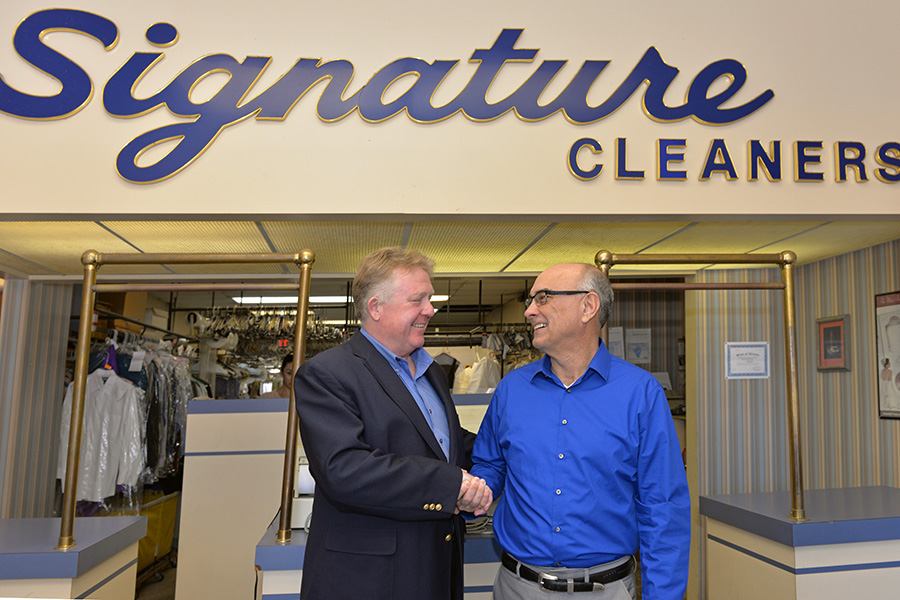Ever wonder what happens to all the clothes that are left languishing at dry cleaners, never to be picked up?
Thanks to a retired software salesman from Naperville and one small business owner, many of those outfits are going to a good cause: helping formerly incarcerated people find new jobs.
It all started with a Bible study. Bill Denwood, the retiree who is also a member of the Disciple Bible Outreach Ministries, approached Stateville Correctional Center in 2015 to start a Bible study for inmates at the maximum security prison. DBOM runs these programs in six other states; the goal is to help inmates find better paths when they return to society, reducing their chance of committing crimes after being released and returning to prison, also known as recidivism.
The proposal is still in the works, but in the meantime, Denwood received an email from Stateville officials last winter asking for donations of business attire for former inmates to wear to job interviews. It's another method to reduce recidivism, since research shows unemployment is often a factor when ex-cons commit crimes. Denwood stopped by his local dry cleaner, Signature Cleaners in Naperville, to ask owner Steven Hirmer if he had anything to donate, and the idea for Suits for Success was born.
Hirmer has worked as a dry cleaner for 30 years, and like most dry cleaners, keeps a rack of unclaimed clothes. He says it was a no-brainer for him. “People drop off things and then leave them, and by the time I call, the phone number is no longer valid. Sometimes we cannibalize them for buttons or other parts that we can use," Hirmer explains. "So [when] Bill asked, I said yes, and I have a better idea: Why don’t we ask all the dry cleaners?"
The industry expert took it one step further, too: "My idea was to get them pressed [at our expense] because many of the guys coming out of prison can’t even afford that,” Hirmer says. He then reached out to Sue Kratz, head of the Illinois Professional Dry Cleaners & Launderers Association, who quickly came on board. Kratz recruited several other area dry cleaners (15 thus far across the Chicago region) and has plans to take the plan national.
Now, people can donate clothes to dry cleaners affiliated with Suits for Success to be pressed and sent to Stateville to help inmates re-enter society.
“Most of these guys just need a chance not to be judged by what they are wearing,” Denwood says. It's the first step in helping ex-cons get back on their feet and contribute to society.
“We want them to get a job. If they don’t have a job they are going to go back to what they were doing and end up back in jail. You get a job, you realize … you can survive without selling drugs, or without whatever they were doing before, and become a productive member of society,” Denwood says.
Hirmer says that with this program, “everybody wins,” especially the taxpayers of cash-strapped Illinois: “For every 1 percent the recidivism rate is lowered, the state saves $15 million dollars, not to mention the increase in tax revenues,” he says.
Denwood provides the hard numbers: one percent of the state's incarcerated population is 450 people. He believes they can help up to 1,800 (4 percent) in one year.
In fact, when Suits for Success exceeded Stateville’s initial need for clothing with more than 700 suits, they reached out to other groups with similar needs—first up, there was Father Michael Pfleger, pastor of St. Sabina on Chicago’s South Side, along with a few halfway houses and other charitable organizations.
“They called and asked if we needed clothing, and I said we need things yesterday,” Pfleger says. “They gave us a lot, and a lot of good stuff, 'cause often when people donate things it’s things that they are throwing away.”
Going forward, Hirmer says one of their partners is trying to start a job training program for the inmates coming out of Stateville. “One of the cleaners in Joliet has a facility and has offered to train new people," he explains. "If someone gets the [dry cleaning] training and is able to do the job without wrecking the clothes, they are worth $20 [an hour] in a heartbeat.”
Hirmer adds that the program can create goodwill for the dry cleaning industry. “For years, the only thing you heard in the news about dry cleaners is that we hurt the environment. That’s not true anymore, but the image persists," he says. "This can help to shine some positive light on dry cleaners."
Pfleger says the program by itself won’t solve the vast problem of prison recidivism or violence in Chicago, but described it as one part of the solution.
“One of the problems is that people think the violence and problems in the city is something that is so large, they just get overwhelmed and not do anything," he says. "If everybody just does their little part of the puzzle, we can turn this thing around.”



